Sara Bain's Blog, page 2
September 17, 2014
UNITED OR UNTIED?
 “We could be on the brink of the end of the United Kingdom as we know it”, said Emily Maitlis of the BBC recently.
“We could be on the brink of the end of the United Kingdom as we know it”, said Emily Maitlis of the BBC recently.On Friday morning, the United Kingdom will feel the full impact of its recent separation. Irrespective of whether Scotland gains independence from the 78th largest sovereign state in the World or not, the great divide has already taken place through the litany of impassioned opinion, and relationships will never be the same again.
Like most divorces, it’s the sparring that cuts the deepest: the angry words, the apportionment of blame, the accusations, the fury and the sulking. When bad relationships come to a head, the parties seldom kiss and make up. Instead it’s down to the divorce lawyer to initiate proceedings and attempt to negotiate a mutually beneficial financial settlement that won’t put one or the other party out of pocket.
As for Scotland, the imminent referendum has split the nation into two almost equal camps: Yes and No. Choosing one or the other should, prima facie, be a simple task but the forensic debate that has accompanied that single question has led to further enquiry on a subject where there is little precedent upon which to offer informed answers. Politicians and supporters from either camp, therefore, have resorted to the usual dirty tactics of the slanging match and opinion, not facts, has provided the bases for serious discussion.
 The romantic ideology of a subdued and conquered nation rising up against its oppressors to the rallying call of freedom can be highly persuasive. Heroes like William Wallace and Robert the Bruce have been resurrected from their graves in aid of the Yes cause only to be met with the boos and jeers of the opposing forces telling them that the people of Scotland should not dwell on the past but look instead to the future.
The romantic ideology of a subdued and conquered nation rising up against its oppressors to the rallying call of freedom can be highly persuasive. Heroes like William Wallace and Robert the Bruce have been resurrected from their graves in aid of the Yes cause only to be met with the boos and jeers of the opposing forces telling them that the people of Scotland should not dwell on the past but look instead to the future.But it is the past that moulds and shapes the individuals we are today and even historical events can form the foundation for emotive argument. Maggie Thatcher’s axe came down on the Scots in the ’80s with as much force as Edward I’s infamous hammer did in the 13th century. The Iron Lady even violated the Act of Union by using Scotland as a testing ground for the poll tax a year before it was inflicted on the rest of the United Kingdom. Westminster commended her efforts by bestowing upon her the highest order of Knighthood. The Scots still hate her.
Tony Blair led his kingdoms into a war which the majority of Scots (as well as the rest of the UK) did not condone. David Cameron’s misguided refusal to include a Devo Max option in the referendum has been taken as evidence that Westminster either underestimated the sheer force of Scottish sentiment or had little care for it.
History has become that proverbial elephant of Scottish pride: the one that may forgive, but refuses to forget.
Scotland will decide tomorrow whether it secedes from, or remains in, a three-hundred year union. Whatever the decision, the strength of national identity, which has been rippling on the surface of Scottish opinion for centuries, has now become a significant tidal force.
Like many other countries across the world, we are on the brink of the end of a unity as we know it, whether Scotland becomes independent or not. Globalisation and the call for national identity has ensured the tide’s been receding for centuries around the shores of bold Britannia. Those mighty waves crashing against her proud flotillas of war and conquest now cause little more than a tiny splash against a plastic bathtub bobbing in the midst of an ever-widening ocean of disappointment and discontent for some.
Yes or no. A nation will decide. My only hope is that, whatever the outcome, we have a final chance to leave the bitterness behind and look forward to a harmonious future with our closest neighbours.
I'll leave you with a note from fellow author Mary Smith:
Something to share and invite others to do for the next few days. Share a Scottish love song and make this a week of love and celebration, whatever way you are voting. There are folk for whom this has been an anxious time, and there are folk, like those in Catalonia, who are banned from this kind of democratic decision. Whether you are voting yes or no, share a song, celebrate your vote, and let's show the world we can respect one another. Something to share and invite others to do for the next few days. Share a Scottish love song and make this a week of love and celebration, whatever way you are voting. There are folk for whom this has been an anxious time, and there are folk, like those in Catalonia, who are banned from this kind of democratic decision. Whether you are voting yes or no, share a song, celebrate your vote, and let's show the world we can respect one another. http
://www.youtube.com/watch?v=RMmtBgMaF5I#t=264
Here's mine from twa local lassies:
Emily Smith, The Silver Tassie: http://www.youtube.com/watch?v=fHgC49wuZ9Q
Mary Barclay, Blackbird: http://www.youtube.com/watch?v=rOC5bYie888
Published on September 17, 2014 13:29
September 15, 2014
Linda FausnetI'm over at Linda Fausnet's blog this week t...
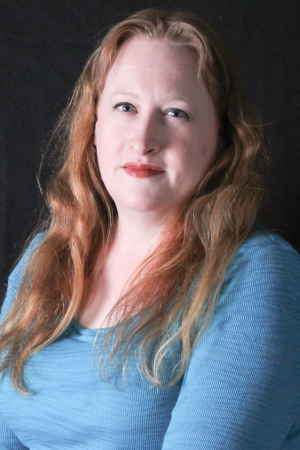 Linda FausnetI'm over at Linda Fausnet's blog this week talking about the importance of the book reviewer to authors and publishers: http://wannabepride.com/blog/
Linda FausnetI'm over at Linda Fausnet's blog this week talking about the importance of the book reviewer to authors and publishers: http://wannabepride.com/blog/Originally a screenwriter, Linda's novel Queen Henry is the story of a homophobic, macho major league baseball player whose participation in a clinical drugs trial alters his life in ways he could never imagine: www.amazon.com/dp/B00LFL3IIO.
Linda is a strong advocate of equal rights and all proceeds of sales of her book go to The Harvey Milk Foundation.
She is also a great supporter of the self-published author and regularly features fellow writers on her blog.
She says: "I ... believe strongly in helping other writers. It's my goal to connect readers with good stories, whether they come from traditional publishers or independent writers."
Published on September 15, 2014 14:00
June 12, 2014
Call of the wild

'We need the tonic of wildness...At the same time that we are earnest to explore and learn all things, we require that all things be mysterious and unexplorable, that land and sea be indefinitely wild, unsurveyed and unfathomed by us because unfathomable. We can never have enough of nature.”
Henry David Thoreau, Walden: Or, Life in the Woods
I HAVE indulged in an illicit love affair with north west Scotland for decades.
Every year, when family and friends are taking planes to far-off sunny climes, living lavish temporary all-inclusive lifestyles on a tropical beach, the solitary voice of the cold wilderness calls me to return.
In response, I pack the tent or, more lately, the camper van, and head north to reunite with my soul.
There is nowhere in the world like the north-west Highlands of Scotland, where deer and eagles are more profuse than people; where humankind has learned to endure rather than prosper; and where contemporary society is a condition that other people are forced to live with.
 Bothy in Drumbeg, looking
Bothy in Drumbeg, lookingout to Eddrachillis BayWhen I was a child, I believed the Highlands began at Dumbarton Rock in the Clyde: the giant sentinel stone marking the gateway to the snow-powdered peaks of the Trossachs.
The further north I travel, however, the further the perspective of remoteness moves. The brooding mountains of Glencoe and sweeping Caledonian forests of Glen Garry no longer hold the same heart-thumping thrill.
The Highlands, for me, begins on the sun-bleached rocky shores of Loch Lochy: this is where I get that surge of excitement that I have actually reached that 'somewhere'. It carries on through Ross and Cromarty and ends in the most spectacular landscapes in the United Kingdom and, to me, the world: Assynt - a magnificent wilderness of rock and water and one of the oldest places in the world.
The mountains in the picture - from left, Canisp, Suilven, Cul Mor and Cul Beag - were squeezed out of the earth in, what geologists call, the Moine Thrust and some of the rocks that have carved this spectacular landscape are over 800 million years old.
 Eight hundred million years ago, the world was just ocean and one big super-continent called Rodina. It was five hundred and fifty years later that the continent broke up, drifted apart and formed the world as we know it today.
Eight hundred million years ago, the world was just ocean and one big super-continent called Rodina. It was five hundred and fifty years later that the continent broke up, drifted apart and formed the world as we know it today.Although Glaciation and warming have further sculpted the mountains around Planet Earth, the hard bedrock of Sutherland is as thrawn and inclement as its climate. This is place that, over the millennia, has refused to be sullied. Although this land has been frequently studied, surveyed and explored, it remains unfathomable; its impact on the soul, immeasurable.
Published on June 12, 2014 16:41
April 28, 2014
Freedom to roam

WHILE the rest of the British Isles and a large part of Europe were blighted with inclement weather over the weekend, a little micro-climate of sunshine hung over the Oban area.
It just so happened that I was there to experience this rare summer weather in April, and without the midges, in this beautiful part of Argyll and Bute.
For anyone who hasn't experienced the unique sensation of freedom and all its associated philosophies that the Scottish Highlands evokes, a trip to this corner of the world will change you forever.
In my haste to get away, I left my precious camera at home and was forced to revert to the rubbish one on my iPhone.
The long walk along a muddy path, clothed by woods and mountains, was well worth the effort as the end of it opened out into Sailean Sligeanach (pictured), a small inlet of the Lynne of Lorne close to Benderloch, where Highland cattle roam freely across the mudflats and the mountains of Lismore and Morvern frown from the horizon behind the sparkling blue sea.
Long may the memory linger.
Published on April 28, 2014 15:20
January 26, 2014
On the shelf
 THE journey of most debut authors - whether mainstream published or self-published - is a long and arduous uphill climb. Few are fast-tracked to the top of the world's reading lists and even fewer make a good living out of writing.
THE journey of most debut authors - whether mainstream published or self-published - is a long and arduous uphill climb. Few are fast-tracked to the top of the world's reading lists and even fewer make a good living out of writing.So why do we bother to do it?
There was a time when I believed there to be no feeling more satisfying for authors than holding a real copy of their first novel.
The ability to thumb through the pages and recognise parts of one's own work in tactile print creates a significant sense of achievement.
Although most authors would say they write books to satiate a personal need, there is also a necessity to share the work with others. Authors of fiction are storytellers and storytellers need listeners. There is little point in telling tales in front of an empty auditorium.
I've just received another five-star professional review of The Sleeping Warrior (http://readersfavorite.com/book-revie...) in which the reviewer Danielle Pinzon described it as 'remarkable'. It is little words like this from complete strangers that make all the effort meaningful and there is nothing better than a sense of worth to raise confidence in a writer and spur them on to do more and do it even better.
The highlight of the month for me was a visit to my local library where I saw a copy of The Sleeping Warrior placed in a prominent position on the shelves. Seeing my book displayed for public access can only be described as one of life's true joys.
The success of a product lies in its potential value to the purchaser - in an author's case, the reader - and the only way to increase recognition is to give readers the means by which to spread the word and share their good experiences. That's why reviews, libraries and bookshops are so important to an author: they provide the physical channel for public access to your book that no amount of social networking can compete with.
Although Amazon is the biggest seller of books throughout the world, its shelves are endless labyrinths of virtual words and books that don't sit in the top one hundred of any particular list will normally fail to get noticed by potential readers. Amazon is also very fickle in that anyone who knows how to manipulate their way to the top of the lists can become an Amazon best-seller for a nano-second and then it's all over.
There are, of course, many exceptions to this rule and I would never seek to underestimate the power of the mighty e-book nor the honest efforts of fellow writers.
I think I'll put what's left of my hard copies to good use and attempt to sell them to more libraries and bookshops: especially the ones with a geographical and genre connection to the book.
I will also try and find more professional reviewers to increase the list of candid, independent analyses.
How that will equate to more readers and sales in the long-term is yet another story to be told.
Published on January 26, 2014 08:21
January 15, 2014
Guest interview
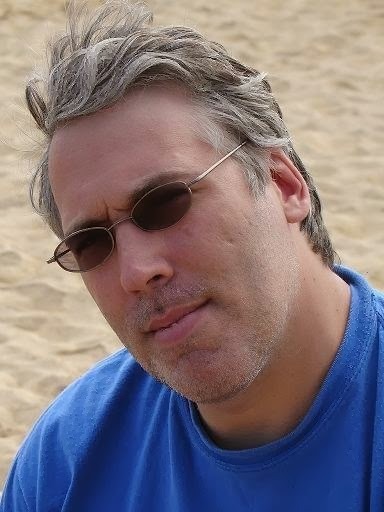 I'M ANSWERING questions over at Giovanni Valentino's blog today: http://giovannivalentino.blogspot.co.uk
I'M ANSWERING questions over at Giovanni Valentino's blog today: http://giovannivalentino.blogspot.co.ukGiovanni is a fellow author who also spends his time and effort supporting others on their publishing journeys.
He's also co-publisher at Strange Musings Press: http://www.strangemusingspress.com
Published on January 15, 2014 15:25
November 19, 2013
I'm an author ... get me out of here
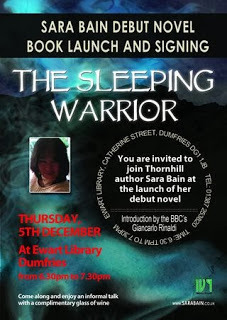 I HAVE FINALLY done it.
I HAVE FINALLY done it.I have just paid a Glasgow printers for a small print run of The Sleeping Warrior and they are due to arrive hot off the press in a few days.
I have also organised a physical book launch in my home town on 5th December: my very first venture out of Cyberspace and into the real world.
For those who don't enjoy being under public scrutiny, there is a lot to be said about internet promotion. You only need to reveal that part of you that you want others to see; tell the curious what you want to tell them; and package yourself with a virtual smile on your face from a photo you are truly sick of looking at.
There is, however, nowhere to hide in the real world. The stammering, the self-doubt and even the warts all light up like the proverbial Beleshia beacons and, before many expectant faces, there is a tendency for even the most hardened of public orators to implode inwards or run screaming to the taxi rank.
A friend of mine, who is also a very successful writer and has made many a public appearance in her time, gave me the following advice:
"Remember to talk more slowly, have a plan. I either type or write about seven or eight headings to keep me on track. If I'm doing a reading, I time it.
"Remember also that, if folk are sitting there, they're already interested."
She also says to be honest and chatty for the inevitable question time.
Although I may appear quite forthright and confident to most of my friends, I am actually quite shy of strangers and absolutely loathe the idea of selling myself.
To counteract this, I am fortunate enough to have enlisted the aid of another very good friend and a local BBC journalist, Giancarlo Rinaldi, who knows me well and will introduce me on the night. He is funny and interesting and will probably put on such a wonderful performance that people will forget about my book signing and ask him for his autograph instead.
In an ideal world, that would be fine for me as I could sneak out the back door and let out a heavy sigh of relief into the cold Scottish evening.
Debut novels, however, rarely sell themselves and, for the past few weeks, I have been printing out posters and placing them on strategic notice boards around the town. I have also been posting the launch on Twitter, Facebook, KILTR, my writing forums and anywhere else with a bit of blank space.The next move is a press release to the local paper and an interview for an article.
On the day, I'm going to find something to wear that the cat hasn't been sitting on and brave my first public appearance as a new author.
I'll report back on 6th December.
Published on November 19, 2013 12:47
November 7, 2013
Safari njema
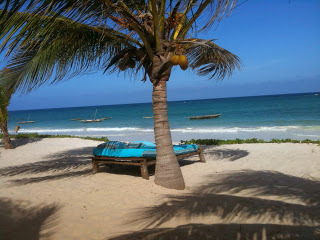 THERE'S something about Africa that gets into the soul.
THERE'S something about Africa that gets into the soul.It's not just the beauty of its natural environment, its culture and its people, Africa is an ancient spirit and, once you've heard it, its song never leaves you.
A trip to Kenya is possibly one of the most gentle introductions to this far-flung continent for the uninitiated.
A hot climate, miles of game reserves, leagues of sandy beaches and a clement welcome, all help to make visitors feel safe and comfortable travelling through the country as well as providing plenty to do and see.
There has been a lot of recent hysteria over the danger to tourists going to Kenya. With election troubles; a fire which gutted the arrivals building at Jomo Kenyatta airport; the Westgate Mall siege; the threat of kidnapping by Somali pirates; and the acid attacks on Christians in Mombasa, the country's tourist industry has taken a heavy blow and, as usual, it's the little people who are suffering from the shortfall of feet from the west.
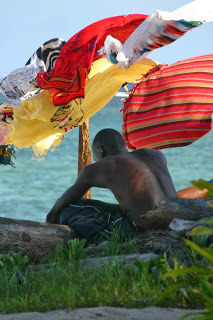 BEACH BOY: Diani beachAlong the eastern coastline lies Diani beach, an exotic picture paradise painted white and azure blue with warm sands, coconut palms and a seascape of breakers gently rolling across a coral reef.
BEACH BOY: Diani beachAlong the eastern coastline lies Diani beach, an exotic picture paradise painted white and azure blue with warm sands, coconut palms and a seascape of breakers gently rolling across a coral reef.Here can be found some of Kenya's most opulent hotels where guests can relax and enjoy all the luxurious hospitality, together with its excessive trimmings, East Africa has to offer.
But Kenya also has a dark side.
At the hotels, the same staff will serve you breakfast as well as dinner and breakfast the next day. Working hours are long and one waiter told me with a smile: "You have to be strong to survive these shifts."
Between the complexes and the beach, a narrow strip of vegetation creates a divide as wide as the Great Rift Valley.
While overweight, over-pampered, scarlet-faced guests sip their cocktails in the shade of a midday sun, poor traders are forced to peddle their wares under the full force of the African heat. They target tourists in the hope of selling their colourful kangas (sarongs), carved wooden animals or even a king coconut.
They know their place and never step across that tiny strip of green that separates them from potential punters. They're not beggars; they don't want something for nothing. Although often annoying, but always warm, happy and exuberant, the "Beach Boys", as they are affectionately known, are just trying to earn a living like everyone else and they'll stand for hours on the beach trying to catch an eye.
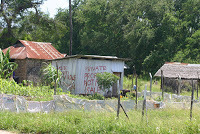 NOT FOR SALE: on the Malindi roadAnd it's not just a few plants that separate the rich from the poor in Kenya. In Nairobi, 60 per cent of the population occupies just six per cent of the land: most of them contained inside the dark confines of Kibera shanty town - the second largest slum on the continent next to Soweto in South Africa.
NOT FOR SALE: on the Malindi roadAnd it's not just a few plants that separate the rich from the poor in Kenya. In Nairobi, 60 per cent of the population occupies just six per cent of the land: most of them contained inside the dark confines of Kibera shanty town - the second largest slum on the continent next to Soweto in South Africa.Fifty per cent of Kibera's inhabitants are unemployed, despite its proximity to the booming industrial area of the city and, as with many poor parts of town, alcohol and drug abuse is rife and health and sanitation is poor.
Along the coastline, there were stories of whole villages being uprooted (some allegedly at gunpoint) and moved out of their traditional homes to make way for new luxury hotels and apartment complexes. Between the millionaires' havens, the road from Ukunda to Malindi is fringed with tiny villages of mud huts with corrugated iron roofs: the real Africa and the places where its true spirit lies.
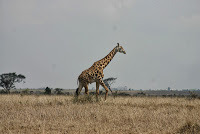 REAL GIRAFFE: Nairobi National ParkIt is true to say that comparisons are odious and it's wrong to attribute western values to the lives of those who are untouched by it. But it's difficult to believe that almost half of the people living in one of the best developed economies in Eastern Africa survive in poverty and lack the basic necessities for human subsistence.
REAL GIRAFFE: Nairobi National ParkIt is true to say that comparisons are odious and it's wrong to attribute western values to the lives of those who are untouched by it. But it's difficult to believe that almost half of the people living in one of the best developed economies in Eastern Africa survive in poverty and lack the basic necessities for human subsistence.It's not my intention to paint a bad picture of a beautiful, vibrant country. Whenever I visit a new place, I like to look below its surface and normally veer away from the spots where tourists are herded.
I did go on a small safari, because I wanted to see with my own eyes animals in their natural habitats that I would otherwise only see in a zoo. The sights were spectacular and I would love to return and visit the Masai Mara some day to do it properly.
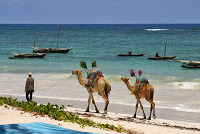 CAMELS and fishing boats in DianiKenya's tourist industry is struggling at the moment because we in the west feel that it is unsafe to travel there.
CAMELS and fishing boats in DianiKenya's tourist industry is struggling at the moment because we in the west feel that it is unsafe to travel there.Terrorism, however, is a global problem and it's doubtful that there's anywhere truly safe in the world.
There's a big military presence along the coastline, all eyes looking out to sea, and security has been stepped up in the cities in order to protect people from harm.
Kenya is a magical place, bursting with spirit, dynamism and contradiction. It is a place where everyone should pay a visit to at least once in their lives to recognise perspective, if nothing else.
Published on November 07, 2013 10:10
October 16, 2013
Resurrection of Borley Rectory
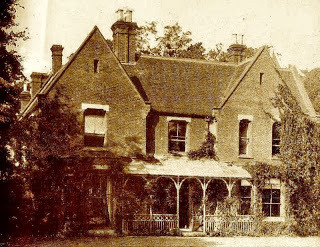 Borley Rectory: the most haunted house in England
Borley Rectory: the most haunted house in EnglandWITH a legendary reputation of being 'the most haunted house in England', it's not surprising that the bones of Borley Rectory have been dug up to produce what is set to be a prominent best-seller in the fiction market.
I remember, in my youth, reading a book about Victorian ghost hunter Harry Price's investigations at the notorious haunted house of Essex. That book terrorised me so much that I couldn't read more than half of it. I had nightmares for years and it put paid to my fascination for the paranormal and things that go bump in the night for many more.
It wasn't just the pictures of the imposing house, the eerie figures, bricks suspended in mid-air or spectral writing on the walls, it was the witness statements and true accounts of horrific paranormal phenomena that occurred in and around the rectory, even when Price was conducting his investigations.
The rectory appeared to have more than one ghost and there was a strong suggestion of poltergeist activity that could not be explained away by fact or science. From my distant recollections, I remember reading about the ghostly figure of a nun who would walk through the garden and peer into the window of the dining room. The vicar got so fed up with the meal-time intrusion that he bricked the window up. A spirit attached itself to a woman called Marianne and would write on the wall beside her, appealing to her to light mass candles. When one young lady got hauled out of bed by the hair by unseen hands and dragged across the room, enough was enough for me and I slammed the book shut forever, finding a cold comfort beneath the covers of my bed with the light on.
There have been very many books, films and documentaries created about Borley over the years and very many websites dedicated to its name. Some dispel the assumption of paranormal activity, others claim to verify the truth of it. Some have even dramatised the events which took place at Borley in serial fiction. Irrespective of whether the stories are true or arise from the mischievous imaginations of some of the rectory's inhabitants, it makes a fabulous ghost story and an off-the-peg template for an instant best-seller.
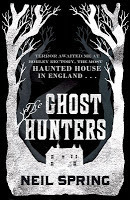 Now novelist and entrepreneur,
Neil Spring
, has resurrected the haunting once more in his book
The Ghost Hunters
which is due to be published next week. From the excerpt I have read, it is a well-crafted, stylised work by an intelligent author who gives meticulous care to structure and sense. There wasn't enough story-line in the excerpt, so I can't fairly comment on his ability for characterisation or plot, but I have a spooky feeling it will be excellent.
Now novelist and entrepreneur,
Neil Spring
, has resurrected the haunting once more in his book
The Ghost Hunters
which is due to be published next week. From the excerpt I have read, it is a well-crafted, stylised work by an intelligent author who gives meticulous care to structure and sense. There wasn't enough story-line in the excerpt, so I can't fairly comment on his ability for characterisation or plot, but I have a spooky feeling it will be excellent.The Ghost Hunters follows Price's investigations through the first-person narrative of his young assistant, Sarah Grey, and Spring asserts that 'the novel isn't just about a haunting, it's about the interpretation of hauntings and the nature of belief.'
I would love to read it but I'm not sure if I have the nerve to re-visit the stories that have haunted me since childhood. Perhaps it's time to lay my ghosts and man-up!
Published on October 16, 2013 14:31
•
Tags:
books, borley-rectory, fiction, ghost-hunter, harry-price
September 28, 2013
Self-promotion for the bashful
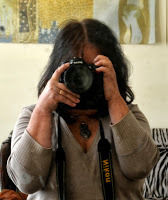 WHEN I told a writing buddy about my fears of falling under the spotlight of self-promotion, he said 'get over yourself.'
WHEN I told a writing buddy about my fears of falling under the spotlight of self-promotion, he said 'get over yourself.'A bit harsh, I know, but he is absolutely right and also happens to be quite a successful author.
I am usually the one behind the camera; the one conducting the interviews; and the one promoting another person's work.
Self-promotion is anathema to me and one of the most difficult tasks a self-published author will ever have to undertake. You just have to let go of the pride and say it's got to be done.
The impersonal nature of social media makes promotional work relatively easy to stomach. It's like creating a mirror image of yourself and hiding behind that artificial persona that really isn't you. I will probably never meet the thousands of Twitter, Facebook and blog followers I've made and so can dare to be a little more blatant about pushing my book on them, often just falling short of spamming.
It is comforting to note that I have joined the serried ranks of thousands of other authors doing the same thing and there's a sense of safety in numbers; a collective conscience with a common goal in mind. Those numbers, however, are so vast that it makes it almost impossible for anyone to notice an individual grain of sand in the desert dunes.
There are, mercifully, many book reviewers, bloggers and readers who generously give up their time to help support authors. I'm compiling a list of them on Pinterest .
Some charge for their time and effort, while others do it for the love of reading or as a cross-promotional tool. I've had a look around the internet and can't find any real evidence of whether paying a site to promote your book actually equates to sales.
The good people who do it for free are not looking for a quick business opportunity and have no intention of fleecing authors. Avid readers will offer to review a book for merely the price of an e-copy; while bloggers, especially those who have just started up, will offer an interview or guest post in order to swell their page counts and followers.
The trouble is that there are just too many authors out there all wanting their books noticed and, I've seen it many a time on Goodreads, a reader will put out a request for review copies and the next moment free books are coming at them in a relentless swarm like a scene from a zombie movie.
There's a lot more about this on my publisher's blog at Ivy Moon Press.
The next step, I am dreading: launching my book and myself in the physical world with no avatar to hide behind.
Makes writing a book seem like a walk in the park ....
Published on September 28, 2013 12:00



